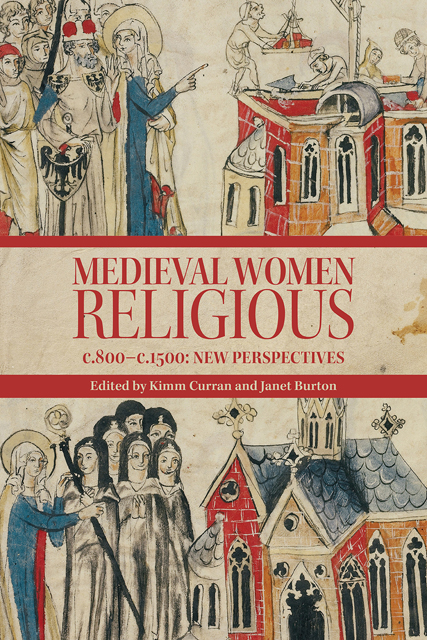Book contents
- Frontmatter
- Contents
- Illustrations
- Contributors
- Preface
- Abbreviations
- Introduction
- 1 Reform, Change, and Renewal: Women Religious in the Central Middle Ages, 800–1050
- 2 New Movements of the Twelfth Century: Diversity, Belonging, and Order(s)
- 3 Change and Renewal: Mendicants and Tertiaries in Later Medieval Europe
- 4 On the Fringes: Anchorites
- 5 ‘Quasi-religious’: Vowesses
- 6 Authority and Agency: Women as Heads of Religious Houses
- 7 Women Religious, Secular Households: The Outside World and Crossing Boundaries in the Later Middle Ages
- 8 Literacies, Learning, and Communal Reform: The Case of Alijt Bake
- 9 Family and Friends: Gift-giving, Books, and Book Inscriptions in Women’s Religious Communities
- 10 Communities of Medieval Religious Women and Their Landscapes
- 11 Materiality and Archaeology of Women Religious
- 12 Between Collective Memory and Individual Remembrance in Women’s Religious Communities
- Select Bibliography
- Index
- Miscellaneous Endmatter
3 - Change and Renewal: Mendicants and Tertiaries in Later Medieval Europe
Published online by Cambridge University Press: 08 June 2023
- Frontmatter
- Contents
- Illustrations
- Contributors
- Preface
- Abbreviations
- Introduction
- 1 Reform, Change, and Renewal: Women Religious in the Central Middle Ages, 800–1050
- 2 New Movements of the Twelfth Century: Diversity, Belonging, and Order(s)
- 3 Change and Renewal: Mendicants and Tertiaries in Later Medieval Europe
- 4 On the Fringes: Anchorites
- 5 ‘Quasi-religious’: Vowesses
- 6 Authority and Agency: Women as Heads of Religious Houses
- 7 Women Religious, Secular Households: The Outside World and Crossing Boundaries in the Later Middle Ages
- 8 Literacies, Learning, and Communal Reform: The Case of Alijt Bake
- 9 Family and Friends: Gift-giving, Books, and Book Inscriptions in Women’s Religious Communities
- 10 Communities of Medieval Religious Women and Their Landscapes
- 11 Materiality and Archaeology of Women Religious
- 12 Between Collective Memory and Individual Remembrance in Women’s Religious Communities
- Select Bibliography
- Index
- Miscellaneous Endmatter
Summary
The story of the mendicants is fundamental to understanding the history of religious life in western Europe during the Later Middle Ages. Focussed on the ideals of poverty, preaching, and presence, these new orders provided both later medieval men and women with examples of the vita apostolica, and expressions of popular devotion. Through sermons, charity, and care for the sick, the major men¬dicant orders – Franciscan, Dominican, and Augustinian – established themselves as mediators between the institutional Church and the laity. Unsurprisingly, those to whom they ministered were not always content to admire their works, and soon sought ways of participating in the forms of devotion modelled by the friars. At first these were unofficial ways of life, but they quickly became subject to a complex (if inconsistent) process of institutionalisation.
The mendicant orders were established by men who became known as friars. The mendicant spirit stretched wider, and reached out to men and women who sought a number of different vocations. Each of these went through their own separate programme of change and renewal. This chapter discusses the development of men¬dicant life, and its implications for those in its ambit. It first discusses monasticised feminine forms of life connected with the friars before moving to its central focus of the women who came to be known as members of third orders or ‘tertiaries’. The stories of mendicants, women religious, and tertiaries are inextricably linked. The various groups emerged from the same spiritual milieu, often had a shared form of devotion, and engaged in mutually beneficial spiritual and social enrichment. At the same time, it is important to remember that each group had its own distinct place in the social, intellectual, and spiritual climate of later medieval Europe.
Mendicancy and Mendicant Orders
The idea that the mendicant orders represented a revolutionary new form of religious life is often repeated both in mendicant chronicles and modern schol¬arship. It is certainly true that their way of life marked a distinct break with traditional monasticism. Rather than attempting to flee the world and find solace in cloistered contemplation, the mendicants took a more practical approach to bringing about Christ's earthly kingdom. To this end, they lived lives of radical poverty. They sought alms, cared for the suffering, and provided education and edification through their preaching. They endeavoured to be the presence of Christ in the world.
- Type
- Chapter
- Information
- Medieval Women Religious, c.800-c.1500New Perspectives, pp. 61 - 75Publisher: Boydell & BrewerPrint publication year: 2023



